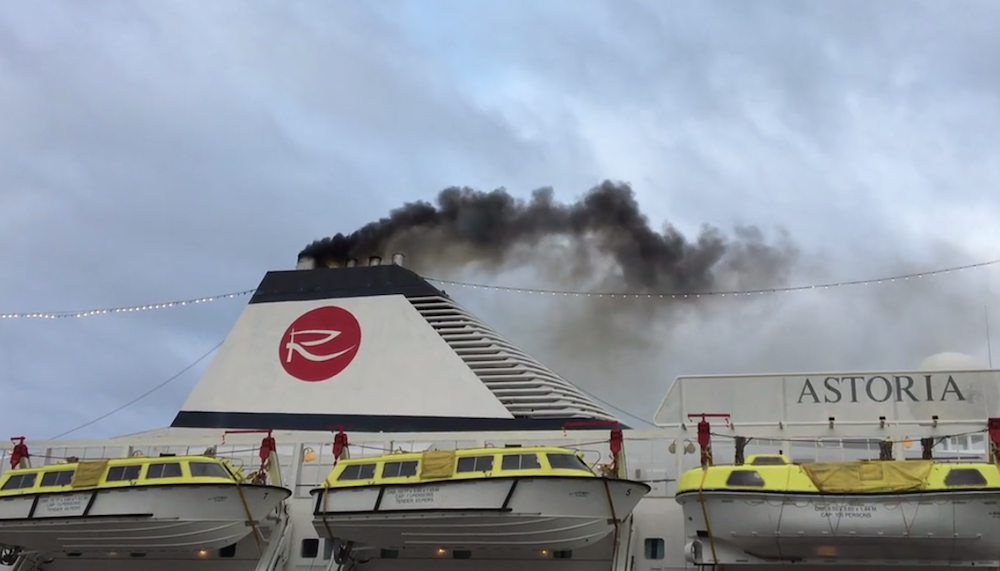Arctic states have mixed record in addressing environmental challenges, WWF scorecard says
Arctic nations aren't doing enough to guard against environmental threats from shipping and other climate-driven changes, the group said.

The world’s Arctic nations have made uneven progress in their responses to problems caused by rapid climate warming, an international organization said in a new report.
The World Wildlife Fund’s 2019 Arctic Council scorecard cited shipping management as the biggest shortcoming in Arctic nations’ policies.
Arctic nations are failing to establish safeguards fast enough to protect northern marine areas from the dangers of shipping that is expanding as sea ice retreats, according to the scorecard. It gives five of the eight Arctic nations Ds, on an A-to-F scale, for failure to protect waters from shipping risks, failure to control air pollutants emitted by vessels and shortcomings in Arctic marine traffic regulation.
Shipping safety is the area where the nations have made the least progress, even as sea ice is vanishing rapidly and more commercial operations are moving north, the report said.
“States are not implementing measures to regulate shipping despite a clear need for better governance and coordination as the effects of climate change make Arctic shipping lanes more accessible,” read the report.
The 2019 scorecard comes just days before the Arctic Council holds its ministerial meeting in Rovaneimi, Finland, to close the two-year Finnish chairmanship. It gives grades for Arctic nations’ progress in protecting biodiversity, establishing conservation areas, adapting ecosystem-based management, reducing problems from black carbon and methane emissions and addressing risks of oil spills as well as addressing the challenge of increased shipping.
It follows up on the WWF’s initial Arctic nation scorecard issued in 2017 in conjunction with the end of the U.S. Arctic Council chairmanship and the Arctic Council ministerial meeting in Fairbanks.
Unlike the 2017 report, the new version does not give evaluations for the performance of the Arctic Council itself. The council operates on consensus, so its performance is based on the policies and performances of the member states, said Peter Winsor, WWF’s Arctic program director. “It’s really an umbrella organization for the national organizations,” he said.
The WWF is an official Arctic Council observer, and the council does good work that makes it a model for other international organizations, Winsor said. Still, there is room for improvement, he said.
In general, climate change is “the elephant in the room” for the council, he said. “If there’s one thing that needs to get strengthened, it’s the work with the climate issue,” he said.
That filters down to shipping concerns and other subjects evaluated in the WWF scorecard, he said.
Biodiversity protection, which is related to shipping because marine biodiversity could be protected by stronger shipping controls, is another weak point identified in the scorecard.
Most nations score a C in biodiversity protection. The U.S. National Arctic Strategy, for example, entirely omits biodiversity-related objectives or discussion of climate-change-related biodiversity resilience or adaptations entirely, resulting in a D rating for U.S. Arctic biodiversity protections.
There are bright spots in the Arctic nations’ performances, according to the scorecard.
The Arctic nations, with the exception of Russia, have made good progress in preparing for oil spills, the report said. The spill threat is rising as shipping activity increases, so additional spill prevention and response work is needed, the scorecard said.
There has been good work toward spill preparation, “but to say that any nation is the Arctic is fully prepared to deal with an oil spill in the Arctic is not true,” Winsor said.
Canada, with an overall B-minus grade, gets kudos for expanding marine conservation areas. Among the accomplishments is a boundary agreement for a national marine conservation area in Nunavut’s Tallurutiup Imanga and a draft land use plan for Nunavut that proposes an expanded network of protected marine areas.
Russia is also commended in the scorecard for expanding protected areas. Those include offshore areas near Franz Josef Land National Park, the Great Arctic State Nature Reserve and the new Khibiny National Park in the Murmansk region and Novosibirsk Islands Federal Nature Sanctuary.
For the United States, with an overall C-plus rating, assessments dipped only slightly from 2017 to 2019. There has not yet been enough time for the Trump administration’s rollback of Obama-era protection to be carried out, Winsor said. In some cases, such as the effort to open Arctic waters to offshore oil drilling, courts have blocked the Trump administration’s policies, he said.
But the Trump administration’s policies, including its rejection of climate science and the Paris Agreement, are expected to damage U.S. Arctic performances in the future, he said.
“If this report cars was issued a year from now, you’d probably see some dramatically lower scores for the U.S.,” he said.
Trump administration policies on climate put the U.S. at odds with the seven other Arctic nations and with other organization associated with the Arctic Council, said Rafe Pomerance, a former U.S. State Department official who is now chairman of the environmental organization Arctic 21. That is resulting in a dispute over how climate change will be addressed at the Rovaniemi ministerial meeting, he said. “There is some significant standoff of language at this point,” he said.
Among those criticizing the U.S. position on climate are Russian President Vladimir Putin and Russian Foreign Minister Sergey Lavrov. The U.S. delegation is trying to prevent the Arctic Council’s declaration from even mentioning the Paris agreement or United Nations sustainability goals, Lavrov said at an Arctic conference held in St. Petersburg last month.
The Trump administration engaged in similar pushback in 2015, attempting to weaken climate and renewable-energy language in the Fairbanks declaration.
Pomerance said the Trump administration’s lack of interest in addressing climate change is evident in other ways.
On his way back from the Arctic Council ministerial in Finland, Secretary of State Mike Pompeo is also traveling to Greenland, but, according to the State Department schedule, “there’s no visit to the ice sheet, no briefing on the ice sheet,” Pomerance said. “That’s stunning.”